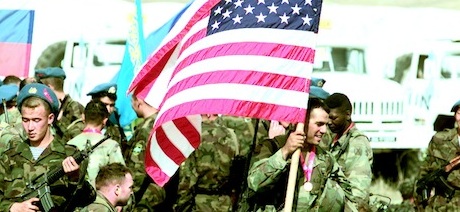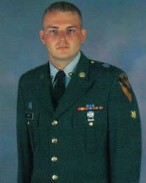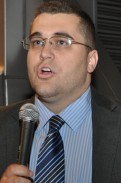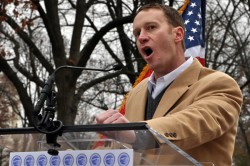National
Discharged gay troops ready to re-enlist
‘That’s the life I was destined to lead’

For Thomas Cook, deciding whether or not to re-enlist in the U.S. military after “Don’t Ask, Don’t Tell” is off the books is a no-brainer.
Cook, a Houston resident who was discharged in 2004 under the anti-gay law, said he “absolutely” plans to rejoin the armed forces on the day that the military’s gay ban is lifted.
“That’s the life I was destined to lead,” Cook said. “I think military service is in my blood and my past experience in the military — I absolutely loved it. I wouldn’t have changed anything about it. I come from a family of military people, and I’m looking forward to going back into the military as soon as I can — Sept. 20.”
Cook, now 29, said he doesn’t intend to enter the same field in the military that he held upon his discharge, nor will he enter the same branch of service. He served in military intelligence in the Army prior to his separation, but Cook said he plans to join the Air Force nursing field to make use of the education he has since received in that area.
On July 22, President Obama, Defense Secretary Leon Panetta and Chairman of the Joint Chief of Staff Adm. Mike Mullen certified that the U.S. military is ready for open service in accordance with the repeal law signed in December, starting the 60-day period for when “Don’t Ask, Don’t Tell” will be a thing of the past on Sept. 20.
Gay service members discharged under “Don’t Ask, Don’t Tell” will be able to re-enter the armed forces from that point forward. Some service members whose separations received media attention said their affinity for military service leaves no doubt in their mind that they’ll re-enter the military as soon as possible.
Cook, who first joined the Army in 2001, said he feels compelled to continue military service even though he was kicked out after he declared his sexual orientation. In 2003, the team leader in Cook’s company said during a training exercise he’d kill anyone in his crew whom he found out was gay. Cook reported the team leader’s remarks to his battalion commander and said the threat alarmed him because he is gay. The confession started Cook’s discharge proceedings, and he was ultimately separated from the Army under “Don’t Ask, Don’t Tell” on Jan. 20, 2004.
Seeking to rejoin the military, Cook was lead plaintiff in Cook v. Gates, a lawsuit challenging “Don’t Ask, Don’t Tell” that was filed by Servicemembers Legal Defense Network. However, the U.S. District Court in Massachusetts and the U.S. First Circuit Court of Appeals upheld the constitutionality of “Don’t Ask, Don’t Tell” in response to the challenge, forcing Cook to wait for legislative repeal before he could re-enter the military.
Cook said he bears no ill-will toward the military even though he was expelled from his position simply for stating his sexual orientation and was unable to reclaim his role through the litigation in which he was lead plaintiff.
“The organization itself has the policy in place, but the people I worked with didn’t necessarily believe in the policy,” Cook said. “I worked with people and the other soldiers that believe the same things I believed, which is anyone and everyone that is eligible to serve and is capable of serving should be allowed.”
Other service members whose discharges received prominent attention also said they intend to rejoin the armed forces after the gay ban is lifted — but aren’t feeling the same need to re-enlist on Sept. 20 as soon as “Don’t Ask, Don’t Tell” is off the books.
Alex Nicholson, executive director of Servicemembers United, is planning to re-enter the military as a member of the Reserves and, after obtaining a law degree, pursue a career as a military lawyer in the Judge Advocate General’s Corps.
“It’s still a lifestyle and a set of people that I am comfortable around and I’ve always had an affinity for,” Nicholson said. “It’s hard to explain the phenomenon and the fraternity that it is.”
Like Cook, Nicholson plans to take a different position than his previous role. Nicholson was an Army intelligence officer prior to his separation at the age of 20 under “Don’t Ask, Don’t Tell” in 2002. A fellow service member outed him to his unit after she read a letter he had written in Portuguese to a man he dated before he joined the Army.
After forming Servicemembers United in 2005, Nicholson became active in the discussion with the White House and Congress that led to legislative repeal of “Don’t Ask, Don’t Tell.” Nicholson was also the sole named plaintiff in the lawsuit Log Cabin Republicans v. United States, which led the U.S. Ninth Circuit Court of Appeals to institute an injunction this year barring further discharges under “Don’t Ask, Don’t Tell.”
Despite his plan to rejoin the military, Nicholson, now 30, said he plans to hold off on re-enlisting for about two or three years as he continues his advocacy work because he doesn’t believe being in the military while acting as a watchdog for gay troops is appropriate.
“I just don’t feel like I would be able to continue to do the job that I do by doing that,” Nicholson said. “That’s going to add a whole additional layer of complexity to the political work, or the watchdog work that we do, if I were to do something like that.”
Also planning to re-enlist is Mike Almy, a former Air Force communications officer who was discharged under “Don’t Ask, Don’t Tell” in 2006. He said he wants back in the armed forces because he has an affinity for it.
“It’s what I’ve done for 13 years,” Almy said. “I miss it, the people, the camaraderie, the mission and want to finish my career.”
After a fellow service member read a private e-mail revealing his sexual orientation and reported the information to his commander, Almy was discharged under “Don’t Ask, Don’t Tell.” He never made a public statement that he was gay, but was nonetheless separated.
Almy, 40, received significant attention as a service member discharged under “Don’t Ask, Don’t Tell” after testifying before the Senate Armed Services Committee last year against the military’s gay ban and taking on tough questioning from Sen. John McCain (R-Ariz.).
The best path that Almy said he sees for re-entering the armed forces is the resolution of the lawsuit in which he is lead plaintiff, Almy v. United States. The case, filed by SLDN and pending before the U.S. District Court of Northern California, seeks to reinstate him and other plaintiffs in the armed forces.
The case, Almy said, represents his best chance to return to the Air Force as an officer because of difficulties in the path ahead if he were to re-enlist at a recruiting station.
“It’s very difficult as an officer to go back on active duty, and that has absolutely nothing to do with ‘Don’t Ask, Don’t Tell,’ but just the fact that being separated and out for a couple years — coupled with the fact that there’s a drawdown — so that’s why we got the lawsuit in the works,” Almy said.
Almy added he’s expecting a resolution to the lawsuit in a couple of months and not the exact same position he held upon discharge, but a position that is comparable and the same rank.
Upon his discharge under “Don’t Ask, Don’t Tell,” Almy lost all the benefits he would have had if he had been allowed to retire on his own accord. His reinstatement in the armed forces would enable him to reclaim those benefits.
“I have none whatsoever,” Almy said. “That’s what we’re trying to get as well. Assuming we’re successful in the lawsuit and win, and get reinstatement, then we’ll pick up where we left off basically, so I’ll get those benefits, go on to finish my career and ultimately retire.”
Kansas
ACLU sues Kansas over law invalidating trans residents’ IDs
A new Kansas bill requires transgender residents to have their driver’s licenses reflect their sex assigned at birth, invalidating current licenses.

Transgender people across Kansas received letters in the mail on Wednesday demanding the immediate surrender of their driver’s licenses following passage of one of the harshest transgender bathroom bans in the nation. Now the American Civil Liberties Union is filing a lawsuit to block the ban and protect transgender residents from what advocates describe as “sweeping” and “punitive” consequences.
Independent journalist Erin Reed broke the story Wednesday after lawmakers approved House Substitute for Senate Bill 244. In her reporting, Reed included a photo of the letter sent to transgender Kansans, requiring them to obtain a driver’s license that reflects their sex assigned at birth rather than the gender with which they identify.
According to the reporting, transgender Kansans must surrender their driver’s licenses and that their current credentials — regardless of expiration date — will be considered invalid upon the law’s publication. The move effectively nullifies previously issued identification documents, creating immediate uncertainty for those impacted.
House Substitute for Senate Bill 244 also stipulates that any transgender person caught driving without a valid license could face a class B misdemeanor, punishable by up to six months in jail and a $1,000 fine. That potential penalty adds a criminal dimension to what began as an administrative action. It also compounds the legal risks for transgender Kansans, as the state already requires county jails to house inmates according to sex assigned at birth — a policy that advocates say can place transgender detainees at heightened risk.
Beyond identification issues, SB 244 not only bans transgender people from using restrooms that match their gender identity in government buildings — including libraries, courthouses, state parks, hospitals, and interstate rest stops — with the possibility for criminal penalties, but also allows for what critics have described as a “bathroom bounty hunter” provision. The measure permits anyone who encounters a transgender person in a restroom — including potentially in private businesses — to sue them for large sums of money, dramatically expanding the scope of enforcement beyond government authorities.
The lawsuit challenging SB 244 was filed today in the District Court of Douglas County on behalf of anonymous plaintiffs Daniel Doe and Matthew Moe by the American Civil Liberties Union, the ACLU of Kansas, and Ballard Spahr LLP. The complaint argues that SB 244 violates the Kansas Constitution’s protections for personal autonomy, privacy, equality under the law, due process, and freedom of speech.
Additionally, the American Civil Liberties Union filed a temporary restraining order on behalf of the anonymous plaintiffs, arguing that the order — followed by a temporary injunction — is necessary to prevent the “irreparable harm” that would result from SB 244.
State Rep. Abi Boatman, a Wichita Democrat and the only transgender member of the Kansas Legislature, told the Kansas City Star on Wednesday that “persecution is the point.”
“This legislation is a direct attack on the dignity and humanity of transgender Kansans,” said Monica Bennett, legal director of the ACLU of Kansas. “It undermines our state’s strong constitutional protections against government overreach and persecution.”
“SB 244 is a cruel and craven threat to public safety all in the name of fostering fear, division, and paranoia,” said Harper Seldin, senior staff attorney for the ACLU’s LGBTQ & HIV Rights Project. “The invalidation of state-issued IDs threatens to out transgender people against their will every time they apply for a job, rent an apartment, or interact with police. Taken as a whole, SB 244 is a transparent attempt to deny transgender people autonomy over their own identities and push them out of public life altogether.”
“SB 244 presents a state-sanctioned attack on transgender people aimed at silencing, dehumanizing, and alienating Kansans whose gender identity does not conform to the state legislature’s preferences,” said Heather St. Clair, a Ballard Spahr litigator working on the case. “Ballard Spahr is committed to standing with the ACLU and the plaintiffs in fighting on behalf of transgender Kansans for a remedy against the injustices presented by SB 244, and is dedicated to protecting the constitutional rights jeopardized by this new law.”
National
After layoffs at Advocate, parent company acquires ‘Them’ from Conde Nast
Top editorial staff let go last week

Former staff members at the Advocate and Out magazines revealed that parent company Equalpride laid off a number of employees late last week.
Those let go included Advocate editor-in-chief Alex Cooper, Pride.com editor-in-chief Rachel Shatto, brand partnerships manager Erin Manley, community editor Marie-Adélina de la Ferriére, and Out magazine staff writers Moises Mendez and Bernardo Sim, according to a report in Hollywood Reporter.
Cooper, who joined the company in 2021, posted to social media that, “Few people have had the privilege of leading this legendary LGBTQ+ news outlet, and I’m deeply honored to have been one of them. To my team: thank you for the last four years. You’ve been the best. For those also affected today, please let me know how I can support you.”
The Advocate’s PR firm when reached by the Blade said it no longer represents the company. Emails to the Advocate went unanswered.
Equalpride on Friday announced it acquired “Them,” a digital LGBTQ outlet founded in 2017 by Conde Nast.
“Equalpride exists to elevate, celebrate and protect LGBTQ+ storytelling at scale,” Equalpride CEO Mark Berryhill said according to Hollywood Reporter. “By combining the strengths of our brands with this respected digital platform, we’re creating a unified ecosystem that delivers even more impact for our audiences, advertisers, and community partners.”
It’s not clear if “Them” staff would take over editorial responsibilities for the Advocate and Out.
Federal Government
Two very different views of the State of the Union
As Trump delivered his SOTU address inside the Capitol, Democratic lawmakers gathered outside in protest, condemning the administration’s harmful policies.

As President Donald Trump delivered his State of the Union address inside the U.S. Capitol — touting his achievements and targeting political enemies — progressive members of Congress gathered just outside in protest.
Their message was blunt: For many Americans, particularly LGBTQ people, the country is not better off.
Each year, as required by Article II, Section 3 of the Constitution, the president must “give to the Congress Information of the State of the Union.” The annual address is meant to outline accomplishments and preview the year ahead. This year, Trump delivered the longest State of the Union in U.S. history, clocking in at one hour and 48 minutes. He spoke about immigration, his “law and order” domestic agenda, his “peace through strength” foreign policy doctrine, and what he framed as the left’s ‘culture wars’ — especially those involving transgender youth and Christian values.
But one year into what he has called the “Trump 2.0” era, the picture painted outside the Capitol stood in stark contrast to the one described inside.
Transgender youth
In one of the most pointed moments of his speech, Trump spotlighted Sage Blair, using her story to portray gender-affirming care as coercive and dangerous. Framing the issue as one of parental rights and government overreach, he told lawmakers and viewers:
“In the gallery tonight are Sage Blair and her mother, Michelle. In 2021, Sage was 14 when school officials in Virginia sought to socially transition her to a new gender, treating her as a boy and hiding it from her parents. Hard to believe, isn’t it? Before long, a confused Sage ran away from home.
“After she was found in a horrific situation in Maryland, a left-wing judge refused to return Sage to her parents because they did not immediately state that their daughter was their son. Sage was thrown into an all-boys state home and suffered terribly for a long time. But today, all of that is behind them because Sage is a proud and wonderful young woman with a full ride scholarship to Liberty University.
“Sage and Michelle, please stand up. And thank you for your great bravery and who can believe that we’re even speaking about things like this. Fifteen years ago, if somebody was up here and said that, they’d say, what’s wrong with him? But now we have to say it because it’s going on all over, numerous states, without even telling the parents.
“But surely, we can all agree no state can be allowed to rip children from their parents’ arms and transition them to a new gender against the parents’ will. Who would believe that we’ve been talking about that? We must ban it and we must ban it immediately. Look, nobody stands up. These people are crazy. I’m telling you, they’re crazy.”
The story, presented as encapsulation of a national crisis, became the foundation for Trump’s renewed call to ban gender-affirming care. LGBTQ advocates — and those familiar with Blair’s story — argue that the situation was far more complex than described and that using a single anecdote to justify sweeping federal restrictions places transgender people, particularly youth, at greater risk.
Equality Virginia said the president’s remarks were part of a broader effort to strip transgender Americans of access to care. In a statement to the Blade, the group said:
“Tonight, the president is choosing to double down on efforts to disrupt access to evidence-based, lifesaving care.
“Rather than allowing families and doctors to navigate deeply personal medical decisions free from federal interference — or allowing schools to respond with nuance and compassion without putting marginalized children at risk — the president is instead advocating for reckless, one-size-fits-all political control.
“At a time when Virginians are worried about rising costs, economic uncertainty, and aggressive immigration enforcement actions disrupting communities and families, attacking transgender young people is a blatant political distraction from the real challenges facing our nation. Virginia families and health care providers do not need Donald Trump telling them what care they do or do not need.”
For many in the LGBTQ community, the rhetoric inside the chamber echoed actions already taken by the administration.
Earlier this month, the Pride flag was removed from the Stonewall National Monument under a National Park Service directive that came from the top. Community members returned to the site, raised the flag again, and filed suit, arguing the removal violated federal law. To advocates, the move was symbolic — a signal that even the legacy of LGBTQ resistance was not immune.
Immigration and fear
Immigration dominated both events as well.
Inside the chamber, Trump boasted about the hundreds of thousands of immigrants detained in makeshift facilities. Outside, Democratic lawmakers described those same facilities as concentration camps and detailed what they characterized as the human toll of the administration’s enforcement policies.
Sen. Ed Markey (D-Mass.), speaking to the crowd, painted a grim picture of communities living in fear:
“People are vanishing into thin air. Quiet mornings are punctuated by jarring violence. Students are assaulted by ICE agents sitting outside the high school, hard working residents are torn from their vehicles in front of their children. Families, hopelessly search for signs of their loved ones who have stopped answering their phones, stop replying to text… This is un-American, it is illegal, it is unconstitutional, and the people are going to rise up and fight for Gladys Vega and all of those poor people who today need to know that the people’s State of the Union is the beginning of a long fight that is going to result in the end of Republican control of the House of Representatives and the Senate in the United States of America in 2026.”
Speakers emphasized that LGBTQ immigrants are often especially vulnerable — fleeing persecution abroad only to face detention and uncertainty in the United States. For them, the immigration crackdown and the attacks on transgender health care are not separate battles but intertwined fronts in a broader cultural and political war.
Queer leadership

After delivering remarks alongside Robert Garcia, Kelley Robinson, president of the Human Rights Campaign, took the stage and transformed the freezing crowd’s anger into resolve.
Garcia later told the Blade that visibility matters in moments like this — especially when LGBTQ rights are under direct attack.
“We should be crystal clear about right now what is happening in our country,” Garcia said. “We have a president who is leading the single largest government cover up in modern history, we have the single largest sex trafficking ring in modern history right now being covered up by Donald Trump and Pam Bondi In the Department of Justice. Why are we protecting powerful, wealthy men who have abused and raped women and children in this country? Why is our government protecting these men at this very moment? In my place at the Capitol is a woman named Annie farmer. Annie and her sister Maria, both endured horrific abuse by Jeffrey Epstein and Ghislaine Maxwell. As we move forward in this investigation, always center the survivors; we are going to get justice for the survivors. And Donald Trump may call this investigation a hoax. He may try to deflect our work, but our message to him is very clear that our investigation is just getting started, and we will we will get justice for these survivors.”
He told the Blade afterwards that having queer leaders front and center is itself an act of resistance.
“I obviously was very honored to speak with Kelley,” the California representative said. Kelley is doing a great job…it’s important that there are queer voices, trans voices, gay voices, in protest, and I think she’s a great example of that. It’s important to remind the country that the rights of our community continue to be attacked, and then we’ve got to stand up. Got to stand up for this as well.”
Robinson echoed that call, urging LGBTQ Americans — especially young people — not to lose hope despite the administration’s escalating rhetoric.
“There are hundreds of thousands of people that are standing up for you every single day that will not relent and will not give an inch until every member of our community is protected, especially our kids, especially our trans and queer kids. I just hope that the power of millions of voices drowns out that one loud one, because that’s really what I want folks to see at HRC. We’ve got 3.6 million members that are mobilizing to support our community every single day, 75 million equality voters, people that decide who they’re going to vote for based on issues related to our community. Our job is to make sure that all those people stand up so that those kids can see us and hear our voices, because we’re going to be what stands in the way.”
A boycott — and a warning
The list of Democratic lawmakers who boycotted the State of the Union included Sens. Ruben Gallego, Ed Markey, Jeff Merkley, Chris Murphy, Adam Schiff, Tina Smith, and Chris Van Hollen, along with dozens of House members.
For those gathered outside — and for viewers watching the livestream hosted by MoveOn — the counter-programming was not merely symbolic. It was a warning.
While the president spoke of strength and success inside the chamber, LGBTQ Americans — particularly transgender youth — were once again cast as political targets. And outside the Capitol, lawmakers and advocates made clear that the fight over their rights is far from over.



















